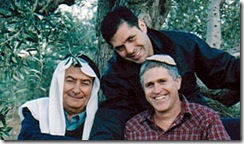PeaceWorks Selected by BusinessWeek among ‘America’s Most Promising Social Entrepreneurs’
We are honored that BusinessWeek chose PeaceWorks among 25 of "America’s Most Promising Social Entrepreneurs."
If you like what we do, we’d appreciate you voting here for us – PeaceWorks Holdings – as the top 5 will be featured in the magazine.
http://images.businessweek.com/ss/09/04/0403_social_entrepreneurs/19.htm
Peaceworks Holdings
peaceworks.com
Daniel Lubetzky, 40
New York, N.Y.
Can joint business ventures end violence and fundamentalism in the Middle East and other hot spots around the world? Stanford Law School grad Daniel Lubetzky is proving they can. He hit on the idea for his "not-only-for-profit" business model while on a fellowship in Israel in 1993. A year later, he launched a joint venture between Israelis and Palestinians, a line of all-natural tapenades and spreads under the labels Moshe & Ali’s and Meditalia. which we first wrote about last year. More recently, PeaceWorks introduced Bali Spice, a line of Asian sauces manufactured by women’s cooperatives made up of Muslims, Christians, and Buddhists in Indonesia and Sri Lanka. "I try to create business and social models that work intrinsically well together where the business itself advances a social cause and vice versa," says Lubetzky. Four years ago, he also introduced Kind Fruit & Nut Bars, a for-profit venture.
From the beginning, Lubetzky has plowed 5% of his profits from his companies into the Peaceworks Foundation to empower moderate Israeli and Palestinian voices who want to work toward a two-state solution in the Middle East. In 2008, Peaceworks Holdings had about $15 million in revenue and became a Skoll Foundation grantee. Next year, Lubetzky expects to bring in between $25 million and $30 million.
They also quote the following in their main story:
One of this year’s finalists, Daniel Lubetzky, founder of $25 million Peaceworks, which works as a catalyst for peace by encouraging joint snack-food ventures among people of different backgrounds in volatile regions around the world, says it is not enough to impose an artificial business model on a social issue. Lubetzky, who was awarded a $1 million grant from the Skoll Foundation in 2008, says that doing good alone will not ensure success. "I had an earlier company that totally tanked," he says. "I didn’t understand the product line well, but I was passionate about the mission. The failure taught me that one can’t advance a social mission if the business model doesn’t sell. You can’t just sell a social mission. You still have to come up with the best product with the best prices." Given the current economic climate, that rings particularly true.
related posts
-
Social Entrepreneurship Profile on BusinessWeek
Thanks to Stacy Perman for a profile about PeaceWorks, KIND, and OneVoice in BusinessWeek yesterday. Viewpoint August 6, 2008, 1:03PM EST text size: TT Making Social Entrepreneurship Matter Daniel Lubetzky’s "not-only-for-profit" business has created profitable joint ventures with Palestinians and Israelis. His model deserves attention by Stacy Perman I recently came across an article [...]
-
BusinessWeek Call for Submissions
BusinessWeek’s Stacey Perman asked me to share this opportunity with social entrepreneurs: …BusinessWeek’s upcoming roundup of the most promising social entrepreneurs in the U.S. – those who aim to both turn a profit and solve social problems. We are now in the process of searching for great candidates, and I want to ask for your [...]
-
The Social Capitalist
I love the title of this award that was kindly bestowed by Fast Company and the Monitor Group on the PeaceWorks Foundation among "43 Entrepreneurs Who Are Changing the World." Their description: The amazing organizations that received the Fast Company/Monitor Group Social Capitalist Awards have found a better way to do good: They’re using the [...]
-
New York Times’ article on PeaceWorks/KIND bars – and the rules and opportunities for manufacturers online
Bob Tedeschi of the New York Times today wrote in his e-commerce column about the difficult balancing act that manufacturers like PeaceWorks have to make in the online world, when selling to consumers without undermining their retail sales channel. http://www.nytimes.com/2007/08/13/technology/13ecom.html?_r=1&ref=business&oref=slogin The basic rule and the basic opportunity in this space are as follows: * [...]
-
Skoll Foundation Recognizes PeaceWorks/OneVoice
We are very proud and grateful of SKOLL’s generous and energizing support of our social entrepreneurship, as detailed here.














post a new comment